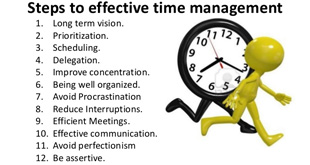 Time Management looks to me like a “never-ending” story. There are thousands of books and articles written about this topic, which is always “hot”. Technologies are getting more and more advanced and one of the key goals behind that is to save time and efforts of humans to free-up the time for more things to do at a certain time intervals, but still, the question of how to manage time effectively remains “hot”. I just want to share a couple of basic concepts about Time Management: What it is and what may still our time.
Time Management looks to me like a “never-ending” story. There are thousands of books and articles written about this topic, which is always “hot”. Technologies are getting more and more advanced and one of the key goals behind that is to save time and efforts of humans to free-up the time for more things to do at a certain time intervals, but still, the question of how to manage time effectively remains “hot”. I just want to share a couple of basic concepts about Time Management: What it is and what may still our time.
Time is our most valuable resource. By analyzing time usage on a regular basis, it is possible to understand the most efficient ways to use time, both in and out of the workplace.
Time is the most democratic resource. Everyone has the same amount of time – no matter, how rich or poor, young or old.
Fast or slow. The rate that time passes may be a state of mind. For example, think back 5 years, 10 years, 20 years. As we age, does time move faster or do we just think it does? Perhaps, it depends on whether we are bored, interested, nervous, or excited.
Time is finite. It can never be retrieved – once time has ticked by, then it has gone!
Time is a limited resource. Money cannot buy time.
You cannot decide what to deal with today unless you know where you want to be tomorrow. Any plan to improve your use of time depends on being clear about your goals. Goals should give a clear indication of where you want to be at a given point in time. A well-known SMART model of goal setting might serve as a good example.
You may find yourself in the situation when you plan a lot, do a lot, but still cannot catch up with the things to be managed. Think of possible bottle-necks and road-blocks…. there might be the things which simply steal your time.
 Common Time Stealers
Common Time Stealers
Internal:
- inability to plan and prioritize the workload
- butterflying – from task to task leaving things unfinished
- attempting to do “too much”
- Techno-failures (computer, telephone, etc.)
- Procrastination! (watch the video and don’t cry afterwards, if you got the feeling that you were looking at the mirror 🙂
External:
- correcting the mistakes of others – often interruptions from other people, telephones…etc.
- changes in procedures and systems without having proper preparation
- poorly performing colleagues not being kept informed
- being given inadequate others
- failing to take decisions
- canceled appointments
- meetings – too long or not necessary
What can we do with all of the above?
- Be positive – think of rewards for success rather than penalties for failure.
- Be firm but flexible.
- Be creative – there are many ways of achieving goals.
- Be patient – learn from own mistakes
- Be organized
- Prioritize your goals
Remember! If the goal does not have clear timelines, this is just a dream, which is unconsciously perceived rather like a virtual thing, and not as real task “on your plate”. Think about the skills you need to achieve the goals you set and update certain skills.
- Re-focus, if necessary.
- Self-control – Maintaining a daily log of how much time you spend on particular activities is fundamental to managing your time more effectively
Certainly it a lot more to say around the subject. By the way, the people actually don’t have a definite answer whether they manage time or time manages them. I personally have the feeling that time manages me quite often, what about you? 🙂
